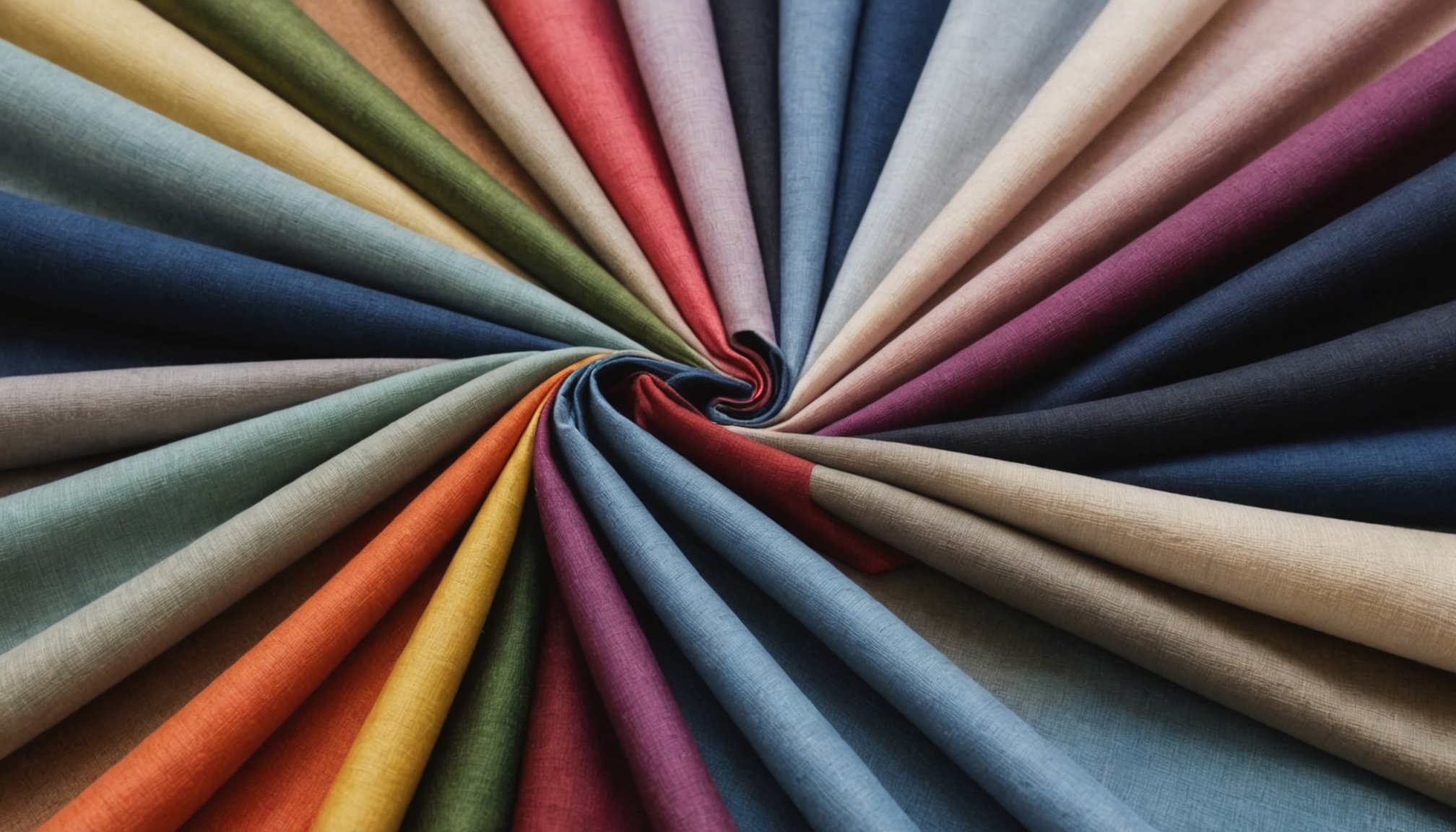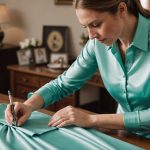The Ultimate Guide to Selecting the Perfect Fabrics for Handmade Dresses in the UK
When it comes to making handmade dresses, the choice of fabric is paramount. It can make or break the entire project, affecting not only the appearance but also the comfort and durability of the dress. In this comprehensive guide, we will delve into the world of fabrics, exploring the best options, tips, and tricks for selecting the perfect fabric for your handmade dress in the UK.
Understanding Your Needs: The Right Fabric for the Right Occasion
Before diving into the various types of fabrics, it’s essential to consider the occasion and the desired outcome of your handmade dress. Here are a few questions to ask yourself:
In parallel : Ace Your London Rainy Day Look: Expert Tips for Stylish Outfit and Umbrella Coordination
- What is the dress for? Is it for a formal event, a casual day out, or perhaps a special occasion like a wedding or a birthday?
- What is the season? Different fabrics are more suitable for different seasons. For example, lightweight fabrics like cotton and linen are perfect for summer, while heavier fabrics like wool and velvet are better for winter.
- What is your personal style? Do you prefer classic and elegant, or modern and trendy?
- What is your budget? Fabrics can vary significantly in price, so it’s crucial to set a budget before making your selection.
Popular Fabrics for Handmade Dresses
Cotton Fabric
Cotton is one of the most versatile and popular fabrics for dressmaking. It is soft, breathable, and available in a wide range of colors and patterns.
- Benefits: Cotton is easy to work with, durable, and suitable for all seasons. It is also a great choice for beginners due to its forgiving nature.
- Types: There are several types of cotton fabrics, including plain cotton, cotton lawn, and cotton voile. Cotton lawn, such as Liberty’s Tana Lawn, is particularly popular for its softness and fine weave[2].
- Example: For a summer dress, a lightweight cotton fabric with a floral pattern would be an excellent choice.
Linen Fabric
Linen is another favorite among dressmakers, especially for summer dresses. It is known for its breathability and natural cooling properties.
Topic to read : Chic weekend style: innovative ways to flaunt your british trench coat
- Benefits: Linen is lightweight, durable, and has a unique texture that adds a touch of elegance to any dress. It is also highly sustainable and eco-friendly[3].
- Types: Pure linen and linen blends are available. Pure linen can be a bit more challenging to work with due to its tendency to wrinkle, but it offers unparalleled breathability.
- Example: A linen dress in a natural color is perfect for a summer evening outing.
Silk Fabric
Silk is a luxury fabric that adds a touch of sophistication to any dress. It is smooth, lustrous, and comes in various weights and textures.
- Benefits: Silk is comfortable against the skin, drapes beautifully, and can be used for both formal and semi-formal dresses.
- Types: There are several types of silk fabrics, including silk satin, silk chiffon, and silk habotai. Silk satin is particularly popular for its smooth, glossy finish[4].
- Example: For a formal event, a silk satin dress in a jewel-toned color would be stunning.
Velvet Fabric
Velvet is a luxurious fabric known for its soft, plush pile and rich texture. It is perfect for making dresses that exude elegance and sophistication.
- Benefits: Velvet is warm, luxurious, and adds a dramatic touch to any dress. It is ideal for winter dresses and special occasions.
- Types: There are several types of velvet fabrics, including cotton velvet, silk velvet, and stretch velvet.
- Example: A velvet dress in a deep red or black color is perfect for a winter formal event.
Where to Buy Fabrics in the UK
Finding the right fabric can be a daunting task, but there are several excellent resources in the UK where you can find high-quality fabrics.
Discount Fabrics LTD
Discount Fabrics LTD is a great online resource for dressmakers. They offer a wide range of fabrics, including cotton, linen, velvet, and more. Their website allows you to browse and purchase fabrics by the metre, making it easy to get exactly what you need[1].
Clothkits
Clothkits is another excellent option for those looking for premium craft and dressmaking fabrics. They feature a beautiful collection of Liberty fabrics, known for their iconic prints and high-quality materials. Their website also offers a range of sewing patterns and craft kits[2].
Fabric Godmother
Fabric Godmother is a popular online shop that offers a diverse range of dress fabrics, including deadstock fabrics. They have a variety of cotton, silk, and other materials, and their website is user-friendly, making it easy to find the perfect fabric for your project[4].
Tips for Choosing the Right Fabric
Here are some practical tips to help you choose the right fabric for your handmade dress:
Feel the Fabric
Before buying, always feel the fabric. This will give you an idea of its texture, weight, and drape.
Read Reviews
Check reviews from other customers to get an idea of how the fabric works and any potential issues.
Consider the Season
Choose fabrics that are suitable for the season. For example, lightweight fabrics for summer and heavier fabrics for winter.
Match Your Skill Level
If you are a beginner, start with easier-to-work-with fabrics like cotton or polycotton.
Detailed Comparison of Popular Fabrics
Here is a detailed comparison of some popular fabrics for handmade dresses:
| Fabric | Benefits | Drawbacks | Best For |
|---|---|---|---|
| Cotton | Soft, breathable, easy to work with, durable | Can shrink, may not drape as well as other fabrics | Casual dresses, summer wear |
| Linen | Breathable, lightweight, durable, sustainable | Wrinkles easily, can be challenging to work with | Summer dresses, formal wear |
| Silk | Luxurious, smooth, drapes beautifully | Expensive, delicate, requires dry cleaning | Formal dresses, special occasions |
| Velvet | Luxurious, soft, adds a dramatic touch | Heavy, can be difficult to work with, expensive | Winter dresses, formal wear |
| Polycotton | Durable, easy to care for, versatile | Less breathable than cotton, may not drape as well | Everyday wear, casual dresses |
Sewing Patterns and Tools
Once you have chosen your fabric, the next step is to select the right sewing patterns and tools.
Sewing Patterns
Sewing patterns are essential for guiding you through the dressmaking process. Here are a few tips for choosing the right pattern:
- Choose a pattern that matches your skill level. If you are a beginner, look for patterns labeled as “easy” or “beginner-friendly.”
- Consider the style of the dress. Make sure the pattern aligns with the type of dress you want to make.
- Read reviews and check the sizing chart. This will help you ensure the pattern fits well and is suitable for your fabric choice.
Tools and Accessories
Having the right tools and accessories can make the sewing process much easier and enjoyable.
- Sewing Machine: A good sewing machine is essential for any sewing project. Make sure it has the necessary stitches and features for your fabric type.
- Scissors and Cutting Tools: High-quality scissors and cutting tools are crucial for accurate cuts and to prevent fabric damage.
- Sewing Notions: Buttons, zippers, threads, and other sewing notions should match your fabric and dress style.
Practical Insights and Actionable Advice
Here are some practical insights and actionable advice to help you in your fabric selection and dressmaking journey:
Use High-Quality Fabrics
Investing in high-quality fabrics will ensure your dress looks and feels great. As notPERFECTLINEN notes, “The beauty of linen lies in its imperfections,” but high-quality fabrics always have a unique appeal and durability[3].
Take Advantage of Free Delivery and Returns
Many online fabric shops offer free delivery and returns. This can be a lifesaver if you need to return or exchange fabric. For example, Clothkits offers 28-day returns on their products[2].
Join Sewing Communities
Joining sewing communities or forums can provide valuable insights and tips from experienced sewists. You can also share your own experiences and learn from others.
Read and Follow Tutorials
There are many online tutorials and blogs that can guide you through the dressmaking process. Websites like Cimmino offer a wealth of information on various fabrics and sewing techniques[5].
Selecting the perfect fabric for your handmade dress is a crucial step that requires careful consideration. By understanding your needs, exploring different types of fabrics, and using the right tools and patterns, you can create a dress that is not only beautiful but also comfortable and durable.
As you embark on your dressmaking journey, remember to feel the fabric, read reviews, and match your skill level to the fabric. With the right fabric and the right tools, you can create a handmade dress that you will cherish for years to come.
So, the next time you are at your sewing shop or browsing online, take a moment to appreciate the variety of fabrics available. Whether you choose cotton, linen, silk, or velvet, each fabric has its own unique qualities that can make your handmade dress truly special. Happy sewing








